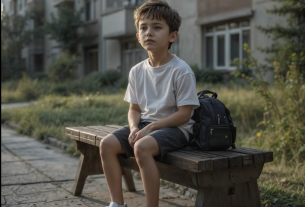In the village of Omutovo, outsiders were not welcome. The moment a stranger appeared on the horizon, curious eyes would peek out from behind curtains, and a silent council of grandmothers would gather on the bench by the gate, keeping sharp watch on the newcomer’s every move. So it was this time too. Down the dusty street that led to the long-abandoned house of the late Zinaida Petrovna came a young woman. Slim, straight-backed, as if carrying an invisible load that made her shoulders unnaturally tense. In her hands—a battered suitcase; in her eyes—dark, deep as a night lake—an inward gaze, fixed far away inside herself.
People stirred and buzzed. Who was she? From where? Someone ran to tell the local policeman. He arrived, checked her papers, spoke with her behind a closed door, and came out to calm the public: a distant relative, he said, of old Granny Zinaida, who had died a few years earlier, surrendering her soul to God at the venerable age of ninety-six. But the old folk only shook their heads, whispering on their porches: “Granny Zina never had kin, not a one. She was an orphan from elsewhere, and an orphan she died.”
The stranger, paying no mind to the whispering and curious looks, began to settle in. The house was ramshackle, listing, but she seemed not to notice the creak of the floorboards or the cobwebs in the corners. First of all, she went out to the kitchen garden overgrown with rank weeds. Day after day, under unfriendly eyes, she dug the soil; her thin but strong hands worked the spade deftly. Most astonishing of all—she did this in the height of summer, when everyone else had long since gathered the first harvest. People laughed and pointed: “Look at the city fool! Who plants in such heat? Nothing will sprout; it’ll all burn up.”
But it didn’t burn. Soon the beds were lush with thick, juicy growth. And what growth! Leaves so full and broad it was as if they were watered not with water but with some life-giving elixir. “There’s no doing without unclean forces here,” decided the villagers. “Witchcraft—what else could it be.” And the nickname stuck—The Witch. Her name was Arina.
She kept away from people, told nothing about herself, lived withdrawn, as if in an invisible cocoon of estrangement. And secrets, as is well known, stoke curiosity stronger than any bonfire, breeding the wildest gossip and conjecture. Soon rumors crept through the village that she had fled the big city from an unhappy, tragic love, bringing with her a whole chest of jewels belonging to a rich, married lover. And so she hid herself, with her shame and her treasure, in a remote, God-forgotten village.
Then misfortune struck. A woman named Anfiska’s three-year-old son Vanyatka choked while playing with a tiny piece from a construction set. The child turned blue, began to rattle and gasp for air. Disaster! The hospital was ten kilometers of dusty road away, and you wouldn’t find a car in the village at midday—everyone was out at the hayfields. In despair, with the sobbing, blue-faced bundle in her arms, Anfiska ran to the house of Arina the Witch, beyond herself with terror.
Arina rushed onto the porch and took stock in an instant. With firm but careful movements she took the little boy, turned him upside down, and gave brisk, precise pats to his back. Once, twice… and from the boy’s twisted mouth a bright plastic piece popped free with a small click. Vanya drew a ragged breath and screamed—the scream of life. Arina silently handed him to his exhausted mother and, without a word, went back inside.
After that, people treated Arina with wary respect. They were afraid of her, but they began to go to her for advice when a tooth ached or the livestock fell ill. But a young fellow named Ivan, who lived with his mother on the edge of the village, was not afraid. He fell in love with her—quietly, faithfully, and without reserve. His mother, Avdotya, wept and wrung her hands: “There are plenty of young, innocent girls around! And he’s taken to that… witch! A woman seasoned by hard life!” She would stand before Arina’s crooked house and shout for the whole street to hear that her son had been bewitched, drugged with a love potion, his youth being ruined. Ivan would walk up silently, lead his weeping, hysterical mother home, and then, a little later, return to his quiet, sorrowful Arina.
The lovers lived, walled off from the world by their small happiness, paying no attention to gossip and wagging tongues. A year later Arina bore a daughter—a bright, clear-eyed girl. They named her Lika. Three years later came a second—Zlata, with hair black as pitch and a nature just as wild and untamed. Little by little, people left the family in peace. Everyone had troubles enough of their own.
One day, after a fierce thunderstorm that raged all night, the ceiling began to leak in the front room. Without a second thought, Ivan climbed onto the roof to repair it. He worked deftly; everything went smoothly. But as he was climbing down the ladder, his foot slipped on a wet rung. He fell from a height, hitting the ground with a heavy, dull thud. Arina ran out at the cry. Her face was whiter than whitewash, but her hands did not tremble. She fetched a doctor from the district center. He examined Ivan, shook his head, and said they must take him to the city hospital at once. Arina arranged a ride with a passing truck, took her husband herself, settled him in a ward, and then returned to her little daughters.
A month later a car stopped in front of her house again. From it they unloaded a roughly knocked-together wheelchair and seated in it a hopelessly pale Ivan, aged by twenty years. His spine, the doctors said, was broken. He would never walk again. Someone mean and envious whispered then—loud enough for all to hear: “It’s her punishment. For the love charm. Such happiness never comes without a price.”
But Arina did not break. She would wheel Ivan onto the porch, turn his face to the gentle sun, prop him with pillows, and then lean close to him, kiss his motionless hands, whisper something in his ear. She did not abandon him; she nursed him; she loved him with all the strength of her great soul. Against such love, any rumor is powerless. She gave him herbal decoctions, massaged him, and word went around the village that any day now Ivan would stand on his feet again—so fierce was this woman’s persistence.
He sat on the porch and carved funny little animals from soft wood for his daughters, wove sturdy, handsome baskets from willow. He worked skillfully, even from a wheelchair. Some men envied him. There seemed nothing to envy, but they did—imagine, a woman carries you in her arms, pampers and cherishes you, and revolves around you alone. If only they had such devotion, such care.
Love, as they say, can work wonders. And indeed, Ivan began cautiously trying to stand, leaning on sturdy crutches made by the local carpenter. One day he sat on the porch, making a painted wooden bird for Zlata, when the sharp knife slipped from his knees, fell, and clinked down the steps. Arina was at the far end of the garden. Buoyed by his recent progress, Ivan decided to go down and pick up the knife himself. He did get to his feet, braced on the crutches, but on the very first step his leg gave way, he lost his balance, and pitched forward. A scythe was standing by the porch. Arina had been cutting grass in the yard and, hurrying to the children, had forgotten to put it away. As he fell, Ivan must have struck it, and the blade—sharp as a razor—drove straight into his neck.
Arina mourned her husband bitterly, to the point of frenzy. People thought she would go into the grave with him. She ate nothing, drank nothing, did not sleep. Little Lika barely dragged her, crazed with grief, away from the coffin as they lowered it into the ground.
She was left alone with two children in her arms. No husband’s pension, no income from his baskets and toys. Yet they lived; they did not beg; they were always fed and clothed. And the whisper started again: Arina must be selling those stolen jewels—bit by bit so as not to draw attention.
After finishing school, the elder girl, Lika, left for the city and trained as a hairdresser. She came home on weekends, and a line immediately formed—some to be shorn themselves, some to bring their children. People paid what they could, mostly in kind: eggs, milk, fresh bread.
Without a man, life was hard for a woman in the village. A house and a homestead needed constant watching—especially an old one like Arina’s. At first, the men tried to help: mending a fence, patching a roof—secretly hoping for a bit of tenderness in return, some feminine gratitude. But Arina accepted help, fed her helpers to repletion, set out vodka on the table, and never let anyone past the threshold. She carried herself with dignity, aloof and cold.
Jealous wives, worn thin by their own burdens, couldn’t stand it. One day they came to her house in a crowd and demanded that she share the secret of her youth and beauty. So many years had passed—grief, privation—and yet she hardly seemed to age at all; only her eyes had dulled and bitter lines had settled at the corners of her mouth. “Let her share the diamonds too, if she has them! If not—we’ll burn her with this cursed house!” shouted the most rabid.
Truth or no, they later told how Arina came out onto the porch—and all recoiled in horror. It was not the still-sturdy woman of before who stood before them but an old crone: hair gone gray, face webbed with wrinkles, back bent. As if she had lived another twenty years in a matter of minutes. “Witch!” the women hissed. “She’s cast a vision on us!” And they scattered home in fear.
Losing her beloved finally broke Arina’s health. She began to ail and fail. She didn’t go farther than the garden. She sent the younger girl, Zlata, to the store.
Zlata grew into a lively, black-eyed, astonishingly beautiful young woman. Finals were around the corner, but her head was full of wind and the dances at the village club. One evening she got ready to go, and Arina flared up and wouldn’t let her. The quarrel was bitter and loud. Neighbors heard them shouting at each other behind closed shutters.
Stepanida, who lived next door, saw Zlata burst out of the house as if scalded and run, sobbing, toward the club. In the middle of the night, Stepanida heard frantic pounding on her window. She ran onto the porch in her nightshirt, ready to scold the girl for nearly breaking the glass, but there Zlata stood in the street, shaking all over, bawling like a calf, saying only, “Mama… Mama…” and weakly gesturing toward her house. Stepanida understood that something terrible had happened and ran to Arina. Arina lay on the floor of the front room by the stove, already cold, with dark, rusty blood congealing at her temple.
Stepanida fetched her husband; they laid Arina on the bed and took Zlata to their place. Zlata flatly refused to stay in the house with the deceased, curled up in a corner, and cried. In the morning, the policeman arrived. Sobbing, Zlata told him how her mother hadn’t let her go to the dance, how they had fought terribly, how she had pushed Arina in a fit of temper and run out. She swore by all that’s holy that her mother had been alive; Arina had even shouted something after her. Stepanida confirmed what she could, though she didn’t quite remember whether she had heard Arina’s cry before Zlata ran out or after. The policeman, a kind man, would not ruin the young girl’s life; he chalked it up to an accident—death from a fall. Punished enough as it was—left alone, with such a weight on her soul.
Lika came to bury their mother. She did everything properly, with great dignity and quiet sorrow, and set a memorial meal for the whole village. But the sisters hardly spoke, standing on opposite sides of the room like strangers. That night Zlata packed her few belongings and fled the village. No one saw her there again.
Later, Stepanida told the neighbors that when Zlata came to her that night, the earrings in her ears glittered even in the darkness—so dazzlingly it hurt to look.
“Never saw diamonds like that in my life… Pure water, fire!” she smacked her lips.
And the gossip sprouted anew, like poisonous mushrooms after rain: Arina had diamonds; Zlata found them and stole them, then ran off so as not to share with her sister. Maybe Arina had tried to take the stolen jewels from her then, and paid with her life.
Lika tried to silence the gossips, but how do you quiet them? In the backwoods, the only entertainment is picking bones and savoring others’ tragedies. At first the older sister came to the village, kept an eye on the neglected house, gathered in autumn what her mother had managed to plant in the garden. And then she stopped coming too.
The house had been old to begin with; without a mistress’s hand it quickly sagged to one side and groaned pitifully. Someone smashed the glass in the only intact window. No doubt the stories of hidden gold gave the local boys no peace—they were looking for a buried hoard.
Seven years passed.
Age had bent Stepanida with rheumatism, as if a heavy stone slab lay on her back and mercilessly pressed her toward the earth. She was walking home from the store one day, one arm with the heavy bag thrown behind her back and the other swinging wide like a speed skater on ice. She walked briskly for an old woman—no keeping up.
She was already past Arina the Witch’s house when something bright, colorful flashed at the edge of her vision. She stopped, turned her head with difficulty, and saw a young woman sitting on the old, crooked bench by the neighbor’s fence; beside her a boy of about five was whacking the rampant nettles with a stick in high spirits. There was a world of nettles that year.
Stepanida realized at once that this wasn’t the older sister, not Lika. Lika was strict, reserved, wore no makeup. But this one—cheeks rouged, lips scarlet, hair flaming red tumbling over her shoulders. A straight-up movie actress from the city.
“Zlatka, is that you? You’ve come home? And that’s your boy then?” Stepanida pointed at the child.
Zlata rushed to her, hugged her, kissed her cheeks; she smelled of cheap perfume and city dust.
“Auntie Dunya, dear! I can’t get into the house. The lock’s rusted fast. Will Uncle Misha help?”
“Wait here; I’ll send him,” Stepanida nodded and hobbled off, looking back again and again at the unexpected guest.
Soon her husband, Uncle Misha, came with a crowbar and hammer, snapped the old lock with a crunch, and shoved the door open with a screech. A smell of must, dust, and old sorrow breathed out of the house. Uncle Misha pushed aside the cobwebs and went in. In the dimness there were signs of intruders: things from a chest strewed on the floor, pillows slit with a knife, floorboards pried up.
“They’ve been rooting around, hunting treasure,” he muttered darkly. He himself once had nailed plywood over the broken window to keep the kids out.
“I’ll put in new glass later,” he said as he stepped back into the air. “You clean up here a bit, then come over to us—Evdokia will feed you.”
At a table laden with pickles and hot pancakes, Zlata told her story. Her voice broke, tears stood in her eyes. She had knocked about in the city; there was no work; she lived in a hostel where mice ran over your clothes at night. The fellow who fathered Kolka dumped her as soon as he heard about the pregnancy. Then they pushed her out of the hostel with the baby in her arms. She lodged with strangers, then took up with a man who turned out to be a thief. He was sent to prison; his mother threw Zlata out of the apartment. And so she came back, wherever her eyes led her. Home.
“I’ll stay a little, get my head straight, decide what to do,” Zlata finished, dabbing a fingertip at her lined eye.
“You’re doing right,” Stepanida nodded. “Your mother, Arina, didn’t go under here either. She ran here once from misfortune. And you won’t go under. Mother Earth feeds us all. Hold fast to her.” She gave Zlata a sack of potatoes, some bread, and a jar of pickled cucumbers to start.
That night, the glass rattled in Stepanida’s house again under desperate pounding. She looked out—Zlata with her son on the threshold. Terror had made their eyes huge as saucers; both were trembling as if with a fever. She let them in. Halting and stammering, Zlata said that someone had been walking in the old house at night. Heavy, measured steps; someone muttering unintelligibly under his breath. The floorboards creaked fearfully; the dishes in the cupboard jingled as if the earth itself were humming. Her little Kolka was so frightened he shook all over. She had named him Nikolai, after his father, by the way.
“My feet will never cross that threshold again!” Zlata cried. “I know it was Mother who came, driving me out. She didn’t forgive me… She didn’t forgive!”
“What nonsense are you babbling, girl?” Stepanida squinted. “Your mother’s long lain in the damp earth. That was your conscience, your worm gnawing you without rest. Looks like you did hurt her badly back then.”
Zlata turned away, staring into the dark window.
“We fought… hard. Had I not gone off to the dance, maybe she’d still be alive… She hasn’t forgiven me for leaving her alone. I won’t go back there—don’t try to make me!”
“Live with us as long as you need,” sighed softhearted Stepanida.
But Zlata didn’t want to be a hanger-on. A widower lived in the village, Mikhail Belov. His children were grown and gone. He kept house, even kept a cow. His surname was Belov, so everyone respectfully called him the White. His given name, it seemed, everyone had forgotten. He took a liking to Zlata and asked her to move in. He needed a mistress for the house, and a boy could use a man’s hand. The sharp-witted Zlata quickly saw how to profit and began selling the White’s milk to summer people at a higher price. They snapped it up gladly—feeding their children wholesome village milk. Zlata had struck a vein of gold.
She lived with the White for two months. She went to her mother’s house rarely, briefly, and only in broad daylight. Her Kolka grew stronger and sun-browned, tearing through the streets with the village kids as if that night’s terror had never happened.
Then one night the whole village woke to a glow—the house of Arina the Witch was on fire. It went up like a torch, with a crackling roar, as if an inferno raged inside. No one even tried to put it out; they only doused the neighboring houses so sparks wouldn’t leap across. In two hours nothing remained but a heap of smoking, charred logs and the blackened but still threatening skeleton of the stove.
The boys, of course, were swarming around the ashes the very next day, scuffing the coals with their boots.
“Keep out of there!” Zlata shouted. “It’s still hot! You’ll get smeared with soot!”
But could you hold boys back? Houses don’t blaze so brightly every day.
Soon Kolka came running too, all smeared and beaming.
“Mom, look what I found!” he cried, holding out a small, blackened lump, melted on one side.
“Let’s have a look,” the White came closer, took the find, and rubbed away the soot with his thumb. From under it flashed dazzling sparks in the sun. The gold had likely melted in the fierce heat, but the diamonds that had framed it had survived and winked coldly, deathly through the grime.
Zlata started as if stung, snatched the lump from the White’s hands.
“It’s mine!” she said sharply, hiding her hand behind her back and pressing the find to her body.
“So the people told the truth,” the White said quietly, very distinctly, and his voice suddenly became frightening. “Your mother did have jewels. Did you kill her over earrings back then? And you robbed your sister too. Looks like Arina even tried to help you and your mother afterward. Maybe it was Arina who burned the house so you wouldn’t find anything more—to stop you.” He looked at Zlata with such a heavy, all-seeing gaze that she recoiled as if from a blow.
That night she packed her things, took all the money she found from the White’s stash, and, waking her son, slipped out of the village without a sound.
Several more years passed.
One day a neat foreign car pulled up at the edge of the village. Out stepped Lika with a solid, well-dressed man. They had come to visit their mother’s home, and found only a plot overgrown with weeds and fresh nettles. Even the stove had been dismantled, brick by brick—so carefully did the bricks lie in neat little piles. Someone had been searching, no doubt, for what could not burn.
A truly ancient, bent Stepanida came out to meet them. Peering with bleary eyes, she recognized Lika and, weeping, told of the fire, of the jewels the boys had found in the ashes, of Zlata’s flight from the White.
“Your little sister fooled everyone. Folks say she killed your mother—though by accident, in a quarrel—so she wouldn’t take those earrings away. A terrible sin lies on her.”
“It’s all gossip, Auntie Dunya,” Lika only shook her head. Her voice was calm and sorrowful. “Nothing but gossip.” The sisters were never seen in the village again.
Gold and diamonds gotten by wrongful means never lead to any good. Rumor had it that because of those very jewels found in the flames, Zlata herself was later killed when she tried to sell them in the city. And the boy, Kolka, was said to have ended up in an orphanage—until Lika took him out. She and her husband had no children of their own. Supposedly someone had seen her in the city with a teenage boy.
Whether that’s true—who can say? But rumors, as they say, don’t arise from thin air. And no one ever unraveled Arina’s secret—why and from whom she hid in that remote village, and where those dazzling, icy stones had come from.
They say diamonds are hard, everlasting stones. Yet fragile human lives shatter on them like glass. They brought happiness to no one. Ivan first became a cripple, then died. Zlata, perhaps, killed her mother because of them and later vanished herself. Only Lika’s pure, bright soul was neither stained nor tempted by those cold, soulless gems. She remained a human being. Perhaps that was her mother’s chief bequest—the legacy of the quiet witch of Omutovo, who knew the price of grief, and love, and tears that remained forever like diamond dew on her tragic fate.



